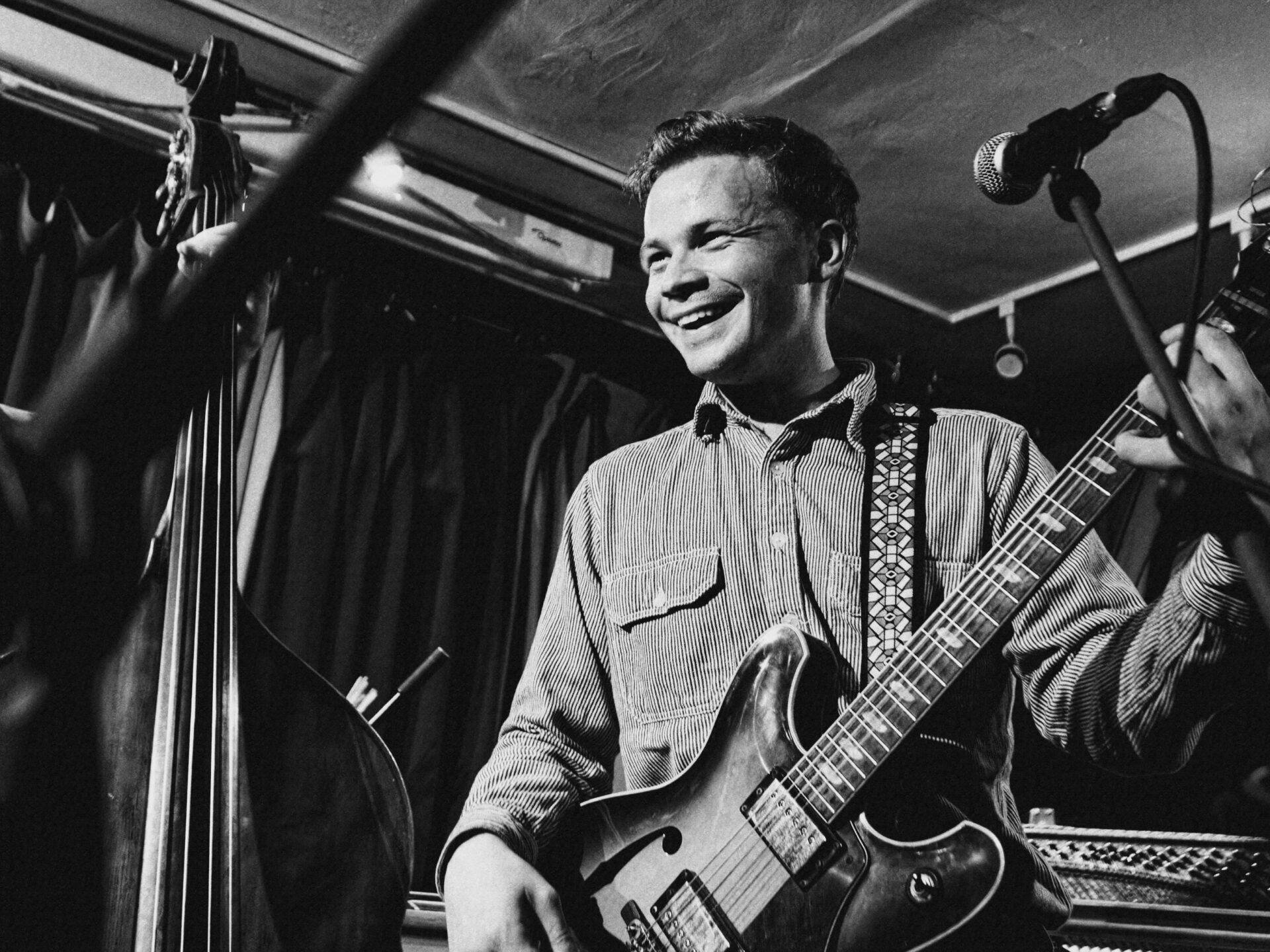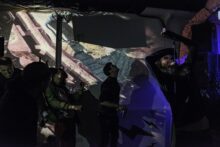Tonight we’re gonna drink till the streets sound like music.
Every bar has that guy. He lives for the promise of night time invention, builds up the self in flights of braggadocio. For a time at least he’s the man.
“I got the ideas for these songs by just going out to clubs and drinking,” Geordie Greep tells me ahead of the release of his solo debut album, The New Sound. “Meeting people and these random guys who just start talking and talking and talking, and at some point they’re telling you more than they want to tell you, and more than they remember a sentence after. Every club you go to there’s guys like that, and there’s always one point [where they try to present the idea]: ‘I’m the man, I’m a G.’ I feel like it’s worth dedicating a whole album to those guys and those stories.”
On the edge of the dance floor, a game of chance is underway. This is high stakes escapism.
The New Sound spends the night with these men, a tribute to their puffed up pride. We also get moments of falter, the dewy eyes and spilled confessions. “When I tell you your pussy is phoney, I want you to slap me and then kiss me”, cries the protagonist of lead single ‘Holy, Holy’. “This whole thing of suave continental guys,” says Greep, men ablaze with booze and bravado.
Drunken voices fill the record with exuberant desperation. The music is played relatively straight, far less of the minute by minute overhauls which came to be the calling card of his former group Black Midi. Instead the sounds of bossa nova, MPB, and jazz fusion are given space to ferment, peculiar new strains grown under the cover of night.
Many were surprised by such a swift next step after the announcement that Black Midi were to be no more. In truth, this record and the split were a long time coming. Greep broke the news on an Instagram live feed: “It was slightly spur of the moment, but a long time lingering, knowing that I’ve got to do something about this. Behind the scenes it [had not been] the best communicative relationship for ages with Black Midi as a band; a bit like… [we would] go on tour and chat for a little bit then come home and not chat for months. There was an agreement to not say anything, it will be fine, people will forget about it. As it went on it was like, I don’t actually think that’s true.”
Does he have any regrets?
“Yeah, it was the wrong thing to do, but it happens. I was on the livestream and everyone was asking and I thought, you know what, it’s finished, it’s probably done forever.”
A frustration with the PRification of online life added to this urge to get the news out and move on: “I’ve been thinking a lot recently about this whole thing where every band and every artist, and now everybody with social media behaves like a corporation. Obviously when protests happen it’s a good thing and it’s good to speak up and use your platform, but when there’s social issues and every average Joe is posting: ‘Here’s what I think about this!’ and it’s like a long paragraph with an infographic. I think this is just strange. Every single guy has a publicity arm in the way that they express themselves. Then with a band everything has got to be above board. I just thought let’s be a bit real about it. What difference does it make if we’re not going to do anything with it anyway?”
Fans were naturally saddened to hear this, though with new projects on the horizon from both Greep and Cameron Picton, I wouldn’t fret too much. From all parties, I get the sense that the best is yet to come, even if the best is made apart from one another.
Rock still holds the archetype of the band as sacrament, it wants blood ties and arrested development, loyalty or nothing at all. The UK is more chronically band centric than most, the side project at best a footnote and at worst an act of minor treachery. But there are whole worlds outside the band. On The New Sound, the rock band feels like a burden offloaded, and the strongest moments are those which most reflect its name, bearing the least resemblance to Black Midi.
“I think it’s a bit weird in rock music, where you’re in a band and that means you’re like brothers,” says Greep, “You have to play together forever, and that’s your whole thing, where with music the best thing is about playing with different people and trying different things.”
Brazil looms large in his new sound. Four tracks were recorded in São Paulo over two somewhat impromptu sessions put together by Fernando Dotta of Balaclava records. “Half the guys couldn’t speak English,” says Greep, “I sent them the songs ahead of time, and I bought chord charts because I thought they wouldn’t know the songs that well and so they’d have something to go off, but when I give it to them all they say: ‘No, we don’t need it, we know all the songs, we’ve got it all by ear.'”
“The bass player was the interpreter as he could speak English,” Greep continues, “He had written his own sheet music and was reading along and directing everyone. It was constantly a Chinese whispers vibe: I talk to him, he talks to him, but it was also that classic thing like in movies where one of them would say a paragraph, but all that would get back to you would be, ‘Ah yeah, that sounds good to me.’”
The country’s musical ecology has left a profound imprint.
“What I noticed in Brazil is once you get to a level where you’re really good, there’s no competition, or a sense that he’s the best or that guys better than that guy. It’s just different, that’s why in jazz there’s not a thing like that, you play in that person’s band one day and another’s the next. Let’s all play with each other and try different bands all the time. From the beginning it’s about playing with different people. It’s not, we’re this thing and that’s the way it’s going to be.”
Brazilian players like Naná Vasconcelos have been life altering revelations for Greep, in particular his 1980 record Saudades.
Vasconcelos’ is a master of the berimbau, a wooden instrument with one string. Originated in Angola, the berimbau developed a crucial place in the culture of Brazil, heard even today in baile funk tunes like ‘Berimbau Dos Baile’ by MC Biano Do Impéra, MC Delux, DJ Nek$ne and Djay VMC.
It features heavily in capoeira, an Afro-Brazilian discipline which is seen simultaneously as game, dance, martial art, and spiritual practice, often used in this context by three or more players; one low note, one middle, and one high; engaged in highly rhythmic dialogue. The berimbau and capoeira played a role in anti-slavery and anti-colonial struggle, faced with heavy prohibition by oppressing forces.
This machine kills fascists, and that’s no measly metaphor. Sickles have been attached to the berimbau to be used as a makeshift weapon during police raids.
Despite its tonal limitations, Vasconcelos found whole worlds in the berimbau. “He’s just one of the most amazing musicians,” says Greep. “He played with everybody; Milton Nascimento, Egberto Gismonti, he ended up getting into the ECM thing, he played with Joni Mitchell, joined the Pat Metheny group, but his breakthrough is this album called Saudades, one of the best albums ever. He was on tour with Gismonti at an ECM expose of different artists, and he had an idea that he wanted to do a concerto for the berimbau. It’s kind of limited in one way – it’s just like a big stick with a string on it – there’s not many things you can get out of it, but that’s his instrument and he’s a virtuoso on it, and he wanted to do this concerto. He couldn’t read or write music, so he just talked to Gismonti and sang every part in the orchestra, transcribed it over three weeks.”
“They ended up doing this album, it starts off with just the berimbau, and then slowly the whole orchestra comes in. It’s something that could be a bit over the top but it just really works somehow. The music’s quite unusual as well, it’s a weird type of modern classical harmony, and is meant to be about this word saudade, which is used all the time in I think Brazilian Portuguese. It means the feeling of remembering, not even nostalgia but just the verb to remember, as a feeling. I was asking about it and it seems sort of untranslatable. Vasconcelos is from this specific area of the rainforest and he’s wanting to represent that, so he’s mixing these interesting harmonies and at the same time mimicking the sounds of birds and the rainforest. It’s a really epic album.”

The music of Latin America has grown increasingly prominent in Greep’s work, whether it be the influence of Vasconcelos, the devilish avant tango of Astor Piazzolla, or salsa.
As a child he’d hear the rhythms of salsa echo through walls of the club where his mum worked, though he had little direct contact with the dance floor, glimpsing “maybe only feet and stuff”. Salsa’s sound of romp, pomp and sudden blasts fell on unreceptive young ears, though he has since grown enamoured by its subterfuge complexities. These are now his clubs of choice.
“I prefer clubs where they play music like salsa as you have the option to just chill at the side and watch, cause it’s amazing. In Brazil we were going to the samba clubs, they all just know exactly what to do. This is the whole thing with a lot of the music from South America especially, but a lot of folk traditions, music that’s developed over hundreds of years. It’s this thing where it’s extremely refined but very relaxed the whole time, so everyone is just chilling but doing this amazing stuff and not even thinking about it. It’s the same with these songs; they’re melodically really complex, rhythmically it’s quite hard to get right, they have lots of weird structures and pushes, you have to learn every song and read music and be a really good player, but it’s extremely easy to listen to, it doesn’t sound like technical music at all.”
There’s a change of tact with how these inspirations are handled on The New Sound: “Basically with Black Midi it would always be, let’s do a waltz, let’s do a tango song, music with a slight Latin element, a more groovy thing or a funk thing. We’d do it and think, oh no we have to mess it up a little bit, to make it our own thing, so it’s not just playing that kind of music. It ended up that a lot of that wound up sounding the same anyway. For me a lot of it didn’t work, the joke side of it didn’t land so well. So with this one I thought, if I’m going to do a song that sounds like ‘Billie Jean’ or something, let’s play it as straight as possible, so in ‘Holy’ the music has hardly anything that’s stupid or silly or postmodern, making it noisy or anything, just playing it straight.”
“You have to do the music justice,” Greep continues, “Do it properly, otherwise you just end up in this halfway house where you’re doing a pastiche but it’s not anywhere near as satisfying as that thing anyway, so it’s kind of like, who’s the joke really on? And it’s not pastiche in the sense that I’m saying the music isn’t any good, this is all music I really like and think is great and that’s why I want to incorporate it”.
One enduring presence from Black Midi is that of Seth ‘Shank’ Evans, who came to be a key part of that group. ‘Motorbike’ is the only song outside of the instrumental title track not to feature Greep on Vocals, and Evans lends the song a deep resonant croon not unlike David Sylvian.
Evans also worked on the record as its producer. “Originally we were gonna do this album as a duo,” says Greep, “We’d been chatting about it for years doing our own thing, we were gonna call it The New Sound as like two dudes, Hall & Oates kind of thing, doing each other’s songs. But when we got into the process of it I had ten songs and he had one or two, so we thought, alright let’s save that for another time and I’ll do this as my album with him producing it, we work on it, call it The New Sound and it sets up this sort of thing if we wanna do it again anyway.”
‘Motorbike’ is the album’s most collaborative piece of music. “I said it sounds like riding across the desert on a Motorbike. Seth does a draft of the lyrics, brings it back to me, I say, ‘Nah, don’t like it.’ I do the same. He says, ‘Nah, not really into it.’ We do that about ten times and get something which is a real hodgepodge of each other’s ideas, that’s the only song which is properly collaborative on the album I would say. I thought it would be good to have a different singer on because I really like that on Stevie Wonder’s Talking Book. Also I think it’s hard enough to listen to my voice for so long, it’s why I’ve got instrumentals there.”
What makes their collaborative relationship so fruitful?
“We just get on, that’s the main thing, we’re just bros. When we were first talking about doing this thing as a duo, we were also looking at getting other people involved in a producer capacity, and to help or give guidance, but as we were doing it we thought, if we know we wanna produce eventually, why not just start doing it? Anyone that’s a producer, it’s not like over years and years they ascended the ranks and got that title given to them, they just said one day, ‘Oh, I’m a producer.’ Trust your ear and go for it, with time you’ll get good at it. If you listen to the early Frank Zappa albums, he is just doing random things, or Brian Wilson or whoever, just getting people in and saying, record it there and record it there. Production I think is ninety percent confidence, ten percent experience and knowing what you’re doing.”
These musical expansions are coupled with Greep’s growth as a writer. The characters who populate this record are far from stock, and his words have a sense of specificity that doesn’t forbid flourish. Nabokov was an influence here: “I like Nabokov because there’s passages where someone is taking a shit or it’s about sex but it’s written really beautifully. But I like the idea of being direct and not obscuring it but having a stylish way of saying it, not shying away. I feel like all the time, people get halfway through a song get a bit embarrassed about it, when you’ve come this far so you may as well.”
Alternately, the deceptively hard won, straight speaking poetics of Javier Marías have also been a recent touchstone. “It’s the same school as Thomas Bernhard where it’s this flowing monologue, but it’s plotty. The first one I read was A Heart So White, and there’s twists! A really nice approach where it’s forward thinking but not denying you what you want from reading a book in the first place, the reason people have been writing books for centuries. Also really funny and quite poetic. It’s this weird thing where if you play it straight, and speak plainly, a certain kind of poetry comes through as opposed to if you’re trying really hard to be poetic. He’s a great effortless writer, he makes it seem really easy to write like that but it’s really hard to write like that and not look like a prick.”

Greep finds his own sense of ease on The New Sound, more so than his prior work with Black Midi. Where that group could at times veer off down congested cul-de-sacs, here there is a sense of unfurling structure, one precipice reaching out toward the next. There’s a cumulative effect with these songs as well, the record as a whole greater than the sum of its parts, inspired by the sustained atmosphere of albums like The Blue Nile’s Hats.
With words and character we get an increased sense of assurance – though the characters themselves are no less unhinged than those of prior records. You see, there’s a gulf between wacky and weird. Whether or not a character or persona feels like an affection, their eccentricities a little forced, often boils down to how committed you are to selling them, how convincingly you honour their sensibilities in your performance, neither half arsed or resorting to sly winks and arch tricks.
How all this works out in a live setting is an interesting prospect. The show I saw during his residency at Map Cafe had a cast of players come on and off stage, not to mention killer support in the ecstatic jazz of The Bede Quartet. Touring the album, Greep plans to have different sets of musicians to play with in different parts of the world.
“I think it’s a good opportunity to try it,” he explains, “I’ll have one band in the UK and Europe, one band in America, one band in South America, one band in Asia. Play with lots of different people and see what they bring to the songs. Some lend themselves to being played in different ways, a starting point rather than a finished piece of music. With this song ‘Bongo Season’, we’ve been playing that live at the moment, sometimes it’s fifteen, twenty minutes long. We go and take in different ways; ambient directions, explosive moments, there’s a few songs on the album where I want to try things like that, and maybe each of the bands develop in a separate way. I’d love to get to a point where I’m thirty five and I know musicians all over the world.”
This approach shares a spirit with the sadly departed Damo Suzuki, who, along with Black Midi, Greep backed on stage at a now legendary show at The Windmill. “I remember at the time thinking it was a great idea and a great way of doing things, slightly different as he would go around and do improv where it’s different every night. I want a bit more structure than that, but I think the feel of it is really nice, the spirit of it is what music’s all about really, so to get that and have it slightly more organised would be great. Or like the Keith Jarrett thing in the 70s where he’d have a scandanavian band and an American band. What actually happened there was they ended up both going down different paths and releasing different albums, you couldn’t get more different.”
Any logistical hurdles?
“It would be a shot in the dark if we hadn’t already done it in Brazil and those are the recordings that are on the album, so if it’s possible for them to get recordings that are going to be there forever in an hour, then it’s probably really easy to sort a show or a rehearsal.”
This has all been enabled by the absence of the band and rock & roll borders. An unrestricted nomadism now free to take flight.





